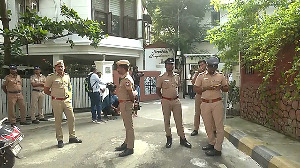Mohammed Sidique Khan, the terrorists' ringleader, took his pregnant wife to hospital two days before the attacks and sent a text message to his fellow bombers telling them that the plans had been delayed.
The details emerged as the full inquests into the deaths of those who died at the hands of Khan, Shehzad Tanweer, Hasib Hussain and Jermaine Lindsay in the suicide attacks five years ago opened in London on Monday.
Khan's wife had a miscarriage on the day of the bombings.
It also emerged that the men had extra bombs and a handgun, which they could have used to defend themselves if stopped by the police, and their original targets included Paddington, Westminster and Kensington. They did not reach their destinations because their train to London was delayed.
Tube bosses waited more than 40 minutes after the explosions before admitting the network was under attack.
Opening the inquest, lawyer Hugo Keith, QC, described the killings the worst terror atrocity committed on British soil as "merciless savagery" and "unimaginable tidal wave of shock, misery and horror."
The bombers killed 52 and injured more than 700 others onboard three London underground trains at Aldgate, Edgware Road and Russell Square, and on a bus at Tavistock Square.
Relatives of the dead have led a five-year campaign for an independent inquiry to examine whether the 2005 bombings could have been prevented.
Keith told the inquest there was evidence that the gang could have been planning to act 24 hours earlier.




